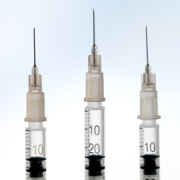The National Institute of Neurological Disorders and Stroke (NINDS) states that meningitis and encephalitis are two neurological conditions where the membranes around the brain and the spinal cord, which make up the central nervous system (CNS), are inflamed. The cause of these disorders is a viral or bacterial infection. The severity of both inflammatory brain diseases range from mild to fatal; some cases resulting in death. Their difference in symptoms include how they affect the brain after infection and the symptoms.
Meningitis
When a patient has meningitis, the inflammation results in a change in the cerebrospinal fluid (CSF), which affects the protection of the brain. The National Institutes of Health (NIH) notes that there are multiple forms of meningitis, which include tuberculous meningitis, aseptic meningitis, syphilitic aseptic meningitis, cryptococcal meningitis, staphylococcal meningitis, gram negative meningitis, pneumococcal meningitis, H. influenza meningitis and meningococcal meningitis. Meningitis can also result from cancer, also known as carcinomatous meningitis. Other causes include tumors, fungi, drug allergies and chemical irritation.
Meningitis infections are divided into two categories: bacterial meningitis and viral meningitis. Viral meningitis is usually less severe and can go away within two weeks with no serious problems. Bacterial meningitis, on the other hand, is a serious condition and requires hospitalization. Viral meningitis is also season-specific. It is more common between late summer and early fall; infection occurs in people under the age of 30, and is most common in children under the age of five.
The Mayo Clinic states that early symptoms of meningitis may be mistaken for flu symptoms; a patient can start showing symptoms within one to two days. Headaches are common, and can be accompanied with vomiting or nausea. The patient may also have a high fever, stiff neck or confusion. Other symptoms include sensitivity to light, seizures, sleepiness and problems waking up. A patient with meningococcal meningitis also has a skin rash; this type of meningitis can be prevented with a vaccination.
Encephalitis
Encephalitis is triggered by a viral infection, which results in cerebral edema; causing damage to the nerve cells and brain, as well as intracerebral hemorrhage, according to the NIH. Encephalitis can be divided into two types of infection: primary form, which is a direct viral infection of the brain, and secondary form, where the viral infection occurs elsewhere and travels up to the brain.
Contraction of encephalitis can occur through viral contact, such as skin-to-skin contact, insect bites, eating or drinking contaminating products or breathing in infected respiratory droplets. The most common types of virus contact vary by region. For example, people living in rural areas are more likely to get encephalitis through an infected mosquito or tick; people living in urban areas are more likely to come into contact with enteroviruses, like coxsackievirus, echovirus and poliovirus. Encephalitis is more prevalent in the elderly and infants, who have weaker immune systems; however, encephalitis is not a common disease, according to the NIH.
The Mayo Clinic states that mild encephalitis symptoms also resemble flu symptoms, such as a headache, joint pain, irritability, fever and lethargy. A more serious infection, however, requires medical attention; symptoms include confusion, hallucinations, loss of consciousness, personality changes, rash, double vision, tremors, seizures, loss of sensation, paralysis and muscle weakness. An infant with severe encephalitis will also have bulging in the fontanels.
----------------------------------------------------------------------------------------------------------------------------
Elizabeth Stannard Gromisch received her bachelor’s of science degree in neuroscience from Trinity College in Hartford, CT in May 2009. She is the Hartford Women's Health Examiner and she writes about abuse on Suite 101.





Add a CommentComments
There are no comments yet. Be the first one and get the conversation started!